Smartphones are many things: impressive, complicated, distracting and useful. But if Google co-founder Sergey Brin has anything to say about it, we need to tack on another adjective: emasculating.
Brin made the baffling assertion at a TED talk on Wednesday in Long Beach, California. He claimed it was so because with a smartphone, “you're standing around and just rubbing this featureless piece of glass.” The obvious implied contrast was with Google Glass, the augmented-reality glasses that Brin and Google have been pushing hard in the last couple of weeks, and I wrote about here at Hazlitt last week.
So far, many people have chalked up the statement to either a poor choice of words, or just straight-up sexism. On the latter point, one assumes that Brin simply meant that if anyone—even girls—could futz around with a smartphone, then Google Glass is for real men, because as we all know, nothing says ‘virile masculinity’ like dainty, fragile eyewear.
I think there’s something else going on here, though, and it's actually much more disturbing. When you stop on the street and poke at your smartphone for information, you are asking it to tell you what to do. You have become subservient to your tech, and have stopped what you’re doing to humbly request it for its wisdom.
With Google Glass—which is just a small window of information in the corner of your eye—you never have to stop. You, my rippling-muscled friend never have to deign to pull out your smartphone and, God, ask directions. You, the strong, sovereign individual can simply exit the subway station, confidently stride to your destination, and bark out commands—“Ok Glass, show directions to the gun store, then liquor store and then the titty bar”—with nary a delay or distraction in sight.
I’m exaggerating a bit, of course, but it’s interesting that Brin’s little slip of the tongue suggests that the idea behind Glass is a modified sense of ‘transparency.’ Tech shouldn’t simply be easy-to-use, it should dissolve into you, not just becoming an inextricable part of who you are, but how you get what you want. It’s not so much augmented reality as it augmented human will. So obviously, anything that gets between you and your desire emasculates you in ways that Freud and Lacan would have a field day with.
Of course, the other way to think of Glass is that it's actually a manifestation of what the smartphone has already done to us. It’s just that with Google Glass, it's simply made more obvious. And maybe that’s the point: that this isn’t a question of the annoying gendered language of ‘emasculation,’ as much as it’s about unknowingly ceding control.






